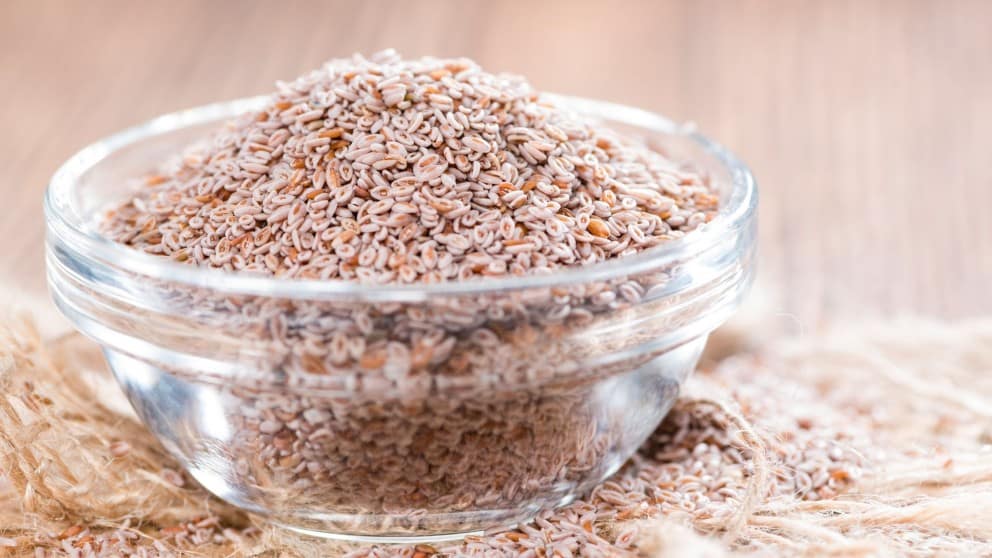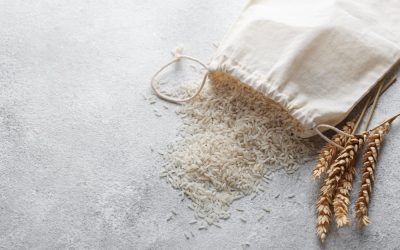The Benefits of Psyllium for Pets

Updated October 13, 2025
Metamucil for Cats & Dogs
By now, you’ve probably heard all about psyllium, although you may not know that it can benefit dogs and cats. But if you’re thinking, “What is psyllium?” we’re here to help! Essentially, psyllium is a natural fiber supplement and a prebiotic that is beneficial for numerous health conditions in people, pets, and horses.
This bulk-forming laxative is used to absorb toxins and relieve constipation, gas, and diarrhea in both pets and people. When mixed with water, it swells and sticks together, facilitating the easy elimination of waste products and toxins.
Because psyllium is so effective in treating diarrhea in pets, it has become a popular go-to natural remedy and supplement. As a nutraceutical, it offers a large number of natural antioxidants and essential sulfur-rich amino acids, as recommended by the FAO for good health.
What is Psyllium? Psyllium Research 101
Before diving into the benefits of psyllium for pets, it’s important to fully understand the research into this supplement. This will help you make an informed decision as to if psyllium is right for your pet and the instances when psyllium for dogs or psyllium for cats can be utilized.
A 2016 Frontiers in Plant Science study adds that “Psyllium contains phenolics and flavonoids that possess reducing capacity and reactive oxygen species (ROS) scavenging activities. In leaves, seeds, and husks, about 76, 78, 58% polyunsaturated, 21, 15, 20% saturated, and 3, 7, 22% monounsaturated fatty acids were found, respectively,” via NCBI “This study reveals that psyllium (P. ovata Forsk) contains nutritional antioxidants, flavonoids, PUFAs, including essential fatty acids (ω-3 and ω-6 fatty acids), sulfur-rich and essential amino acids, and metabolites with bioactivities, which make it a promising candidate for use in the nutraceutical industry. Additionally, psyllium leaves can be used as a green salad together with daily food as a dietary supplement.”
A recent study adds that “psyllium husk mucilage has activities in intestinal regulation, preventing constipation, diarrhea, irritable bowel syndrome, reducing glucose in the post-prandial period, and lowering cholesterol.”
An additional study adds that psyllium is both a therapeutic and drug-delivery agent. “Dietary fibers from psyllium have been used extensively both as pharmacological supplements, food ingredients, in processed food to aid weight control, to regulate glucose control for diabetic patients, and to reduce serum lipid levels in hyperlipidemics,” via NCBI. The study goes on to add the pharmacological importance of psyllium polysaccharide and its gel-forming nature, and adds that it’s beneficial for the treatment of the following conditions:
- Constipation
- Diarrhea
- Irritable bowel syndrome
- Inflammatory bowel disease-ulcerative colitis
- Colon cancer
- Diabetes and hypercholesterolemia
Psyllium has also been shown to increase moisture and bile acid secretion in rats. It helps to regulate triglycerides and blood sugar levels in pets and people. Psyllium has also been demonstrated to help with chronic irritable bowel syndrome (IBM).
Where Does It Come from?
Psyllium is a natural supplement that comes from the Plantago plant. This shrublike herb can have as many as 15,000 gel-coated seeds. It comes in the form of psyllium husks, with each seed encased in a husk. The seed coating contains a rich substance called hemicellulose mucilage. This helps to absorb water as it swells in the intestine.
What Does It Do?
Psyllium has great cleansing ability and is beneficial in gently removing toxins and waste from the body. It helps with constipation and diarrhea in pets and people. Psyllium is thought to promote peristalsis and slow intestinal transit in pets and people because it increases the bulk of all intestinal contents. In short, psyllium does the following:
- Increases stool size
- Relieves constipation
- Treats diarrhea
- It may lower blood sugar levels
- Improves gut health in pets and people
- Helps with weight loss
- May lower cholesterol
How to Use Psyllium for Pets
Though psyllium for pets can be purchased without a veterinarian’s prescription, it’s always best to consult with your vet before adding it to your dog or cat’s diet. When you give your pet psyllium, it’s important to give them the right amount of water. That’s because when psyllium and water interact, the psyllium swells up and helps to move waste and toxins through the intestines. Psyllium is not absorbed through the intestine and takes from 12 to 72 hours to have an effect.
Since psyllium for dogs and cats is reliant on water, you should monitor your pet’s water intake. If your pet has free access to water, they may still experience loose stool, even with psyllium. On the other hand, if they don’t have access to enough water, it can cause constipation. Depending on your furry friend’s lifestyle, your veterinarian can help you better understand how to get the best results from psyllium for pets.
The Best Way to Use Psyllium for Pets
Psyllium for dogs and psyllium for cats should be administered slightly differently from how you may take it as a supplement. Most veterinarians recommend mixing 1/4 to 1 teaspoon of psyllium seeds with a cup of water, and then mixing that together with your pet’s food. As usual, it’s best to start with smaller doses and then slowly work your way up. In this way, you’ll find the proper dosage for your pet.
Again, a veterinary consult always works best so that you can discuss your pet’s health and current medications to ensure that psyllium is the right supplement for your pet.
Using the correct dosage is essential, and age, health, and weight need to be considered for an effective and safe dosage. It’s effective to use in all commercial pet food diets if the pet food formula lacks sufficient fiber. When first using psyllium for pets, you should also monitor their stool to ensure it’s not too loose or too hard.
Precautions for Psyllium for Pets
Since psyllium is an over-the-counter fiber supplement, it’s best used after a consultation with your veterinarian. This is because it interacts with numerous drugs and may be contraindicated for pets with diseases like kidney disease.
Psyllium for dogs may result in the lack of effectiveness of the medication being used. It also should not be used on dogs that have intestinal perforations or obstructions. Psyllium may cause gassiness. Lots of water needs to be provided with psyllium and alongside it since it may result in an esophagus blockage problem.
However, your veterinarian may also recommend psyllium for dogs if your pup has digestion issues. This can include everything from constipation to diarrhea, both of which are uncomfortable for your pet and can lead to other problems down the line. If you’ve taken your dog or cat to the vet before and they’ve been diagnosed with irritable bowel syndrome, psyllium for pets may be the best course of action prescribed by your veterinarian (though, again, no prescription is required to purchase this supplement). As you can see, psyllium for dogs and cats can improve a pet’s quality of life when used in the correct way.
Summary of Psyllium for Pets
Psyllium is a beneficial dietary supplementation source with important antioxidant and anti-inflammatory properties. Any psyllium-based pet supplements should be used in conjunction with access to plenty of fresh drinking water. Encourage your pet to drink plenty of water (but not too much) in order to stay hydrated while on psyllium. Please keep your pet physically healthy and regularly check on their emotional well-being. Here are ways to tell if your dog has anxiety and what to do about them. Or check out our blog for more resources on how to keep your pet healthy with regular veterinary visits and other natural supplements like psyllium.
Trying to find the right vet for your companion? You can read more about choosing a vet that gets your pet here.
FAQs
What is psyllium, and how does it help pets?
Psyllium is a natural fiber supplement from the Plantago plant that forms a gel when mixed with water. It regulates bowel movements by treating both constipation and diarrhea—adding bulk or absorbing excess water as needed.
What conditions can psyllium treat?
It helps with constipation, diarrhea, gas, IBS, and digestive upset. It also regulates triglycerides and blood sugar, aids weight management, and acts as a gentle detoxifier.
Is psyllium safe for my pet?
Generally safe, but always consult your vet first. It can interact with medications and may not be suitable for pets with kidney disease or intestinal obstructions. Ensure your pet has access to plenty of fresh water.
How should I give psyllium to my pet?
Dosage depends on your pet’s age, weight, and health—consult your vet. Mix it into food, start with small amounts, and monitor stool consistency. Always provide ample water.
What makes psyllium different from other fiber supplements?
Psyllium is both a soluble fiber and a prebiotic that can firm up loose stools or soften hard stools. It provides natural antioxidants, supports healthy gut bacteria, and gently cleanses the digestive system.
Resources
- https://journals.plos.org/plosone/article?id=10.1371/journal.pone.0182948
- https://www.ncbi.nlm.nih.gov/pubmed/17329047
- https://www.ncbi.nlm.nih.gov/pubmed/12221223
- https://www.petmd.com/cat/care/cat-diarrhea-5-treatment-options-you-should-try



